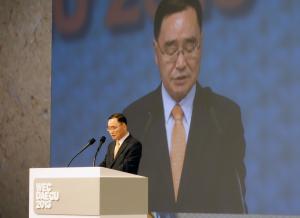For ninety years since the establishment of the World Energy Congress (WEC), global energy issues have revolved around national politics, technology, the economy and—over the past four decades—the price of the oil barrel. Today, as can be felt here in Daegu, Korea, where the 22nd edition of WEC opened this Sunday, there's an added urgency to the matter: discussing energy in 2013 is discussing the future of our planet.
"Energy is a daunting challenge that must be addressed by the international community," said Korean Prime Minister Jung Hong-won as he spoke to some of the 6,000 delegates from 140 countries who have assembled here until Thursday. "It is vital that we form a coherent, long-term framework within which to plan and implement future investments," added WEC Chairman Pierre Gadonneix, the former CEO of the French utility company Electricité de France.
Never before has energy been so high on the agenda of world leaders. Every nation and the world as a whole must face what WEC has identified as the "energy trilemma" of the decades ahead—energy security, energy accessibility and environmental sustainability.
While WEC is about self-promotion, where the largest companies, state-owned power operators, ministries and regulatory agencies compete for the largest and most spectacular exhibition stand, it is also about inventing a vision and drawing scenarios for the future. Gadonneix said he expected "true engagement" from the many policy makers present here in Daegu.




